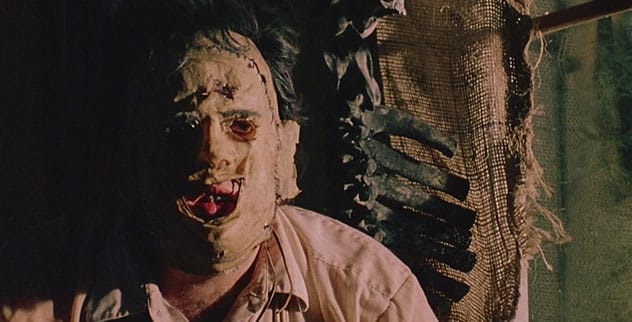Some films delve into the deepest, darkest corners of human imagination. They aim to shock, revolt, and push every boundary. If you’re intrigued by horror that goes to the extreme, then this list is for you. We’re talking about movies filled with gore, unsettling themes, and scenes that are hard to forget. These aren’t your average scary movies; they are truly bloody and disgusting horror movie franchises.
You might wonder who enjoys such extreme films. Well, the fact that these movies spawned multiple sequels shows there’s a dedicated audience. These franchises explore violence and taboo subjects in ways that challenge many viewers. Let’s dive into ten of the most infamous ones. Be warned: this content is not for the faint of heart or easily upset.
10 Guinea Pig Franchise
This Japanese series started in 1985 with Guinea Pig: Devil’s Experiment. It quickly became known for its extreme portrayal of torture. The films are famous for their shocking amounts of blood, guts, and gore. The second film, Guinea Pig 2: Flower of Flesh and Blood, was so realistic it caused a stir. Actor Charlie Sheen even reported it to the FBI, believing it was a real snuff film showing an actual murder!
After an investigation, officials confirmed it was a simulation, though a very convincing one. The series didn’t stop there. Later films continued to show brutal acts of violence, including mutilation and dismemberment. This franchise is a landmark in extreme cinema for its sheer dedication to graphic content.
9 Entrails of a Virgin, Entrails of a Beautiful Woman, and Female Inquisitor
This Japanese trilogy is a bizarre and shocking collection of films. The first, Entrails of a Virgin (1986), mixes softcore adult content with graphic violence against women. The plot follows a film crew making an adult movie who get lost and are attacked by a strange swamp creature. It’s certainly a wild experience for viewers.
The second film, Entrails of a Beautiful Woman, continues in a similar vein, adding even more peculiar monsters. The third installment, Female Inquisitor (also known as Rusted Body: Guts of a Virgin), shifts focus slightly. It centers on a sadistic female interrogator who subjects her captives to horrific tortures. This series consistently pushes the boundaries of taste and decency.
8 Men Behind the Sun & Its Three Sequels
Unlike many films on this list, Men Behind the Sun (1988) focuses on real-world horrors rather than sexual violence. This disturbing movie depicts the alleged activities of Unit 731 of the Imperial Japanese Army during World War II. This unit reportedly conducted horrific medical and biological weapon experiments on human captives. The film shows these events in nauseating detail.
It’s worth noting that the movie’s historical accuracy has been questioned. It’s based on a novel whose facts are considered dubious. Despite this, the film’s impact was strong enough to lead to three sequels: Laboratory of the Devil, Narrow Escape, and Black Sun: The Nanking Massacre. Each sequel continues to portray brutal war crimes and sickening experiments, making for a truly unsettling franchise.
7 Hostel I, II, and III
Eli Roth’s Hostel (2005) brought the idea of “torture porn” to mainstream attention. The film centers on captured tourists who are mutilated and killed for the entertainment of wealthy clients. These clients pay large sums for the chance to inflict pain and death. The movie uses various gruesome tools, like power drills and meat hooks, to create its horrific scenes.
Some critics suggest the film comments on a society driven by illicit desires and profit. Hostel II (2007) continued the theme, this time with female victims and female sadists enjoying the spectacle. However, some reviewers found it to be a step down. The franchise then moved to Las Vegas for Hostel III (2011), which many felt was a weaker entry, losing the gritty feel of the earlier films.
6 Angel Guts Franchise
The Angel Guts series is part of Japan’s “roman porno” genre, which mixes adult themes with drama. This five-film franchise, produced between 1978 and 1994, was inspired by Takashii Ishii’s manga comic Tenshi No Harawata. Each film features a woman named Nami, though she is a different character in each story. A common thread is that Nami is a victim of violence and rape, and the films explore the aftermath of these crimes.
Four different directors worked on the series, leading to variations in how Nami’s character is portrayed. Despite the disturbing content, some see a deeper theme in the Angel Guts films. They can be viewed as exploring the courage of a violated woman in a world dominated by male violence.
5 Red Room and Red Room 2
Daisuke Yamanouchi’s Red Room (1999) has a chillingly simple premise. Four people are locked in a room and compete for a large cash prize. The catch? They must survive escalating acts of torture that they inflict upon each other. What starts as challenges to personal limits soon turns into sexual humiliation, degradation, and intense physical pain.
Reviewers noted that the film’s perverse nature was somewhat offset by a dark, absurd sense of humor. The sequel, Red Room 2 (2000), offered more of the same gruesome competition. Some viewers found the sequel to lean more into psychological torture mixed with physical trauma and sexual abuse. A key element for some was trying to guess the players’ strategies and who would ultimately survive.
4 Freeway and Freeway II: Confessions of a Trickbaby
The Freeway movies stand out on this list due to their Hollywood connections, featuring well-known actors like Kiefer Sutherland and Reese Witherspoon. The first film, Freeway (1996), is a dark and twisted take on the fairy tale “Little Red Riding Hood.” It blends horror, suspense, and dark comedy. In this version, the “wolf” is a psychiatrist and serial killer, and “Little Red Riding Hood” is a troubled teenager named Vanessa.
After Vanessa shoots and robs her attacker, she steals his car, but he survives, leading to plenty of gore. The sequel, Freeway II: Confessions of a Trickbaby (1999), takes its inspiration from “Hansel and Gretel.” This film was generally not as well-received, with some critics calling it excessively violent and vulgar. It follows two escaped teenage convicts who encounter a bizarre character, leading to more mayhem.
3 The Texas Chainsaw Massacre Franchise
Could a horror movie get more iconic than one featuring a family of cannibals in Texas, with one member, Leatherface, wearing a mask of human skin and wielding a chainsaw? Tobe Hooper’s 1974 film, The Texas Chainsaw Massacre, shocked audiences with its raw intensity and gore. Despite this, or perhaps because of it, the film launched a massive franchise with eight additional movies, the latest released in 2022.
Fans seem to crave the series’ unique blend of madness, mayhem, and visceral horror. The original film received mixed reviews; some praised its artistic direction and suspense, while others found it to be exploitative. Regardless, its impact is undeniable. The franchise’s enduring popularity shows that many horror fans appreciate its brutal and gritty approach to terror.
2 Saw Franchise
When James Wan’s Saw hit theaters in 2004, it horrified audiences and became a massive box office success, earning over a hundred million dollars worldwide. The film introduced the world to the Jigsaw killer and his elaborate, deadly traps designed to test his victims’ will to live. Critics had mixed reactions. Some called it compelling and twisted in a good way, while others found it empty and overly gruesome.
Despite the divided opinions, the Saw franchise has become a horror phenomenon. With nine installments to date (the last in 2021), these films have kept audiences on edge with their intricate plots and shocking gore. While not for everyone, the series has clearly found a large and dedicated fanbase eager for each new chapter of Jigsaw’s terrifying games.
1 Nekromantic and Nekromantic 2
Jörg Buttgereit’s Nekromantic (1987) is a deeply controversial film. It tells the story of a woman who develops a romantic and sexual relationship with a decaying corpse that her boyfriend brings home. She ends up preferring the corpse to her living partner. Ironically, Buttgereit stated he made the film to protest government censorship of art.
It was the sequel, Nekromantic 2 (1991), that faced severe legal trouble. German authorities banned the film, confiscated copies, and even raided Buttgereit’s home, attempting to destroy the original negative. They sought to charge him with glorifying violence. Fortunately for Buttgereit, the ban was eventually lifted after an art historian interpreted the film metaphorically, and a judge accepted this view. These films remain some of the most infamous and challenging examples of extreme cinema.
These ten franchises represent some of the most extreme content ever put on film. They explore themes of violence, sadism, and societal taboos with an unflinching gaze. While certainly not for every moviegoer, they hold a significant place in the horror genre for their willingness to push boundaries and evoke powerful, often disturbing, reactions.











What are your thoughts on these extreme horror franchises? Which ones have you dared to watch? Leave your comment below and share your opinions!